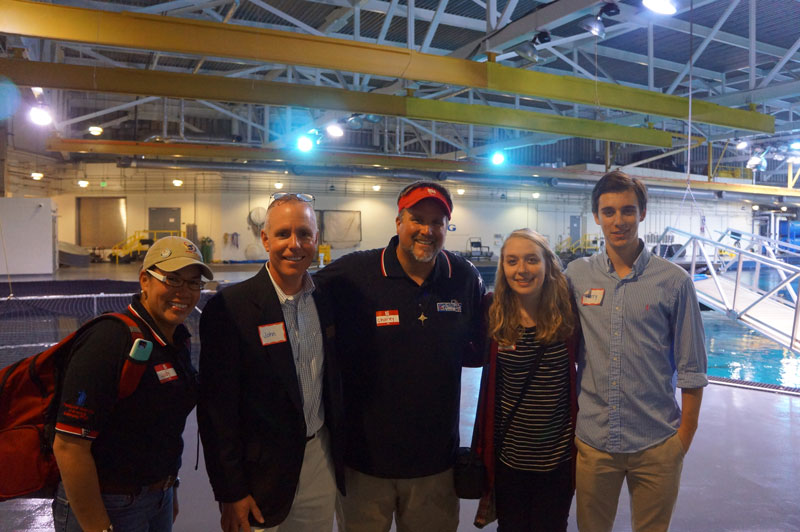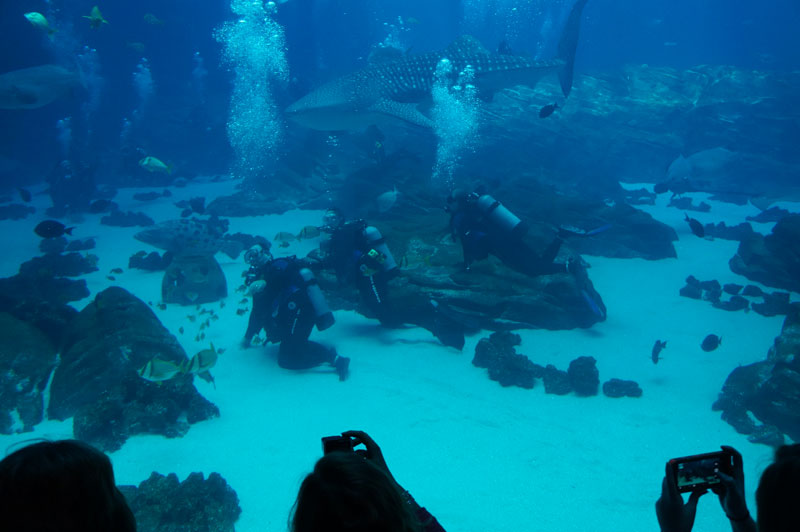
OU students and faculty with the founders of LifeWaters: Jody Paniagua, John Carton, Charley Wright, Katee Gmitro, and Harry Dodsworth.
Dr. John Carton, psychology professor and chair of the Behavioral Sciences division at Oglethorpe, recently led an a innovative research project to investigate the psychological benefits of SCUBA training for individuals with spinal cord injuries and other mobility impairments. He partnered with LifeWaters, a nonprofit organization dedicated to helping spinal cord injured patients and disabled veterans experience the benefits of SCUBA, and enlisted the help of students in his psychology lab at Oglethorpe.
In conjunction with Veterans Day, LifeWaters brought 12 veteran divers and 6 dive “buddies” specially certified to assist divers with spinal cord injuries and limited mobility to the Georgia Aquarium in Atlanta to dive in the monstrous tank containing 16-foot whale sharks and hundreds of other species. Dr. Carton and two students from his psychology laboratory, Katee Gmitro ’16 and Harry Dodsworth ’16, observed the dive and spent the entire day immersed in the process of SCUBA therapy.
While on site, Dr. Carton, Katee and Harry were able to meet and interview all the divers, their dive support staff (buddies) and families. They also toured behind the scenes of the entire aquarium and met the director of the aquatic therapy program and the founding directors of LifeWaters. They observed the divers entering and exiting the large tank where they were diving—which included the whale sharks and 12-foot span manta rays. And, they had the chance to watch the whale sharks’ feeding during a private viewing.
Prior research has shown that SCUBA training can positively affect the mental well-being of participants and even help reduce psychological symptoms. Working with the students in his psychology laboratory, Dr. Carton designed a longitudinal study that involves measuring participants’ mental health prior to entering SCUBA training with LifeWaters and comparing it to their mental health after their certification, after their first dive, and a year later. A “wait list” control group will provide data for comparison.
“Many veterans with paralyzing injuries suffer from a variety of anxiety and mood disorders, for which there is continued need to identify therapies that produce lasting positive effects,” says Dr. Carton. “Anecdotal observations support the hypothesis that SCUBA may go well beyond teaching dive-related skills, to also positively affect the mental well-being of participants and even help reduce psychological symptoms.”
A small scale study that was sponsored by the Cody Unser First Step Foundation several years ago provided some preliminary data to support the hypothesis. Unfortunately, that study was not formally published, replicated, or expanded upon. That is where Dr. Carton’s laboratory stepped in. He brought in his students from his laboratory to help them “better understand the research and to mentor them in the development of additional hypotheses for this research project.”
While at the aquarium, the students collected qualitative data for future hypothesis development and witnessed firsthand the therapeutic outcomes of the program, both for physical and mental health issues. Both students were invited to collect additional data on future dive visits to this facility and other locations.

